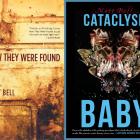Down The Rabbit Hole
Down the Rabbit Hole
Juan Pablo Villalobos
FSG Originals, October 2012
96 pages
$12.00
When a writer makes a child the narrator of literary fiction, a certain amount of pretension has to be involved. After all, in order to handle the existential and symbolic weight of the story, the child will need to be unusually gifted or strangely perceptive. Such is the case with Down the Rabbit Hole’s Tochtli, the preteen son of Yolcault, a reclusive Mexican drug lord, who displays Salingerian genius as he interprets his isolation. And while Juan Pablo Villalobos ultimately fails to create a novella on the level of divine simplicity that his role model Cesar Aira (mentioned not so subtly in the author’s bio) so frequently reaches, he shares Aira’s gift for making bizarre personal crises seem universal in their reach.
The book’s best section follows the family on a fugitive quest to Liberia to acquire Tochtli’s ultimate prize, a pygmy hippopotamus. Here Villalobos is at his bizarre best—no doubt because this is where Aira would have set the entire story, following suddenly clueless kingpins on an impromptu safari. Tochtli and company navigate the streets in ridiculous disguises, using equally bizarre fake names, and after Tochtli secures the group the appropriate party hats, the beasts are finally captured. Now all the hippos need to do is survive weeks of captivity followed by a transatlantic voyage in the hands of pirates. Spoiler alert: they don’t make it. Worse, Tochtli gets the type of horrific front-row ticket to their death that would make the kid from Curious Incident of the Dog in the Night-Time unable to write another word.
Before and after the doomed adventure in Liberia, we spend many pages locked inside the head of Tochtli, who struggles to understand his father’s paranoid agoraphobia by developing his own obsessions with hats and weapons. He envisions himself as a samurai, without fear, pretending to totally reject his father’s protection. His only conduit to the outside world are his father’s henchmen, his whores, and the Marxist tutor Mazatlin, responsible for all of Tochtli’s teaching. Walking through these sections in a review would be meaningless, since both the plot and setting are the boy’s minute observations, which sometimes reach the profundity of Salinger’s youthful observers, and sometimes stutter out into boyish nonsense—such as when Tochtli insists on labeling basically everyone and everything a “faggot.”
It all ends with the confrontation between Mazatlin’s socialist teachings and the Yolcault’s Hobbesian methods, another bloody mess somehow laid at the boy’s feet. Villalobos thinks he has brought us to a revelation about the criminal mind, when really all he has isolated is the codependent madness of this paternal pair. But over the course of this short and colorful work, as Aira would have understood, that’s enough.



